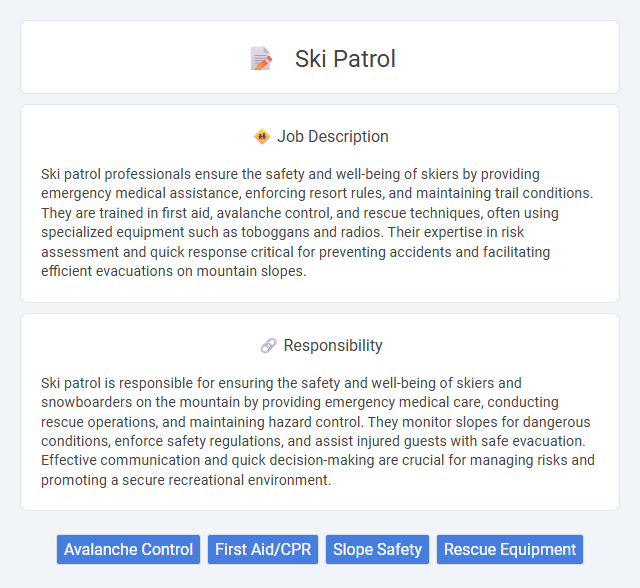
Ski patrol professionals ensure the safety and well-being of skiers by providing emergency medical assistance, enforcing resort rules, and maintaining trail conditions. They are trained in first aid, avalanche control, and rescue techniques, often using specialized equipment such as toboggans and radios. Their expertise in risk assessment and quick response critical for preventing accidents and facilitating efficient evacuations on mountain slopes.
Individuals with strong physical fitness and excellent skiing skills are likely to be suitable for a ski patrol job, as the role often requires navigating challenging terrain to assist injured or distressed skiers. Candidates with good decision-making abilities and a calm demeanor under pressure may have a higher probability of succeeding, given the urgent and potentially dangerous nature of rescue situations. Those with health conditions that impair mobility or endurance might find the demands of this role less compatible with their capabilities.
Qualification
Ski patrol professionals require certification in first aid, CPR, and avalanche safety to ensure effective emergency response on the slopes. Proficiency in skiing or snowboarding combined with rescue techniques and medical training is essential for managing injuries and facilitating evacuations. Strong communication skills and physical fitness are critical to operating in challenging alpine environments and coordinating with emergency services.
Responsibility
Ski patrol is responsible for ensuring the safety and well-being of skiers and snowboarders on the mountain by providing emergency medical care, conducting rescue operations, and maintaining hazard control. They monitor slopes for dangerous conditions, enforce safety regulations, and assist injured guests with safe evacuation. Effective communication and quick decision-making are crucial for managing risks and promoting a secure recreational environment.
Benefit
Ski patrol work likely offers significant benefits such as comprehensive safety training and access to a close-knit outdoor community. Employees may also receive perks like ski pass discounts and the opportunity to develop emergency medical skills valued in various careers. The role probably provides seasonal flexibility, appealing to those seeking temporary or part-time employment during winter months.
Challenge
Ski patrol jobs likely present numerous physical and mental challenges, requiring quick decision-making skills in high-pressure situations. Navigating unpredictable weather and terrain conditions probably adds complexity to rescue operations. The role often demands strong teamwork and resilience to ensure the safety of skiers and snowboarders.
Career Advancement
Ski patrol professionals gain valuable experience in emergency medical response, mountain safety, and rescue operations, creating a strong foundation for career growth. Opportunities for advancement often include becoming a ski patrol supervisor, avalanche safety specialist, or ski resort safety director, which require specialized training and certifications. Continuous education in first aid, avalanche control, and leadership skills significantly enhances prospects for higher-level positions within ski resort management and safety departments.
Key Terms
Avalanche Control
Ski patrol teams specializing in avalanche control play a critical role in ensuring mountain safety by conducting controlled detonations to prevent spontaneous avalanches and assessing snowpack stability using advanced tools like snow pits and seismic sensors. These professionals collaborate with meteorologists and use GPS technology to monitor avalanche-prone areas, enabling timely road closures and skier evacuations. Expertise in avalanche rescue techniques, first aid, and the use of rescue equipment such as transceivers, probes, and airbags is essential for minimizing risk and responding swiftly to emergencies.
First Aid/CPR
Ski patrol professionals are highly trained in First Aid and CPR to provide immediate medical assistance on the slopes, ensuring rapid response to injuries caused by skiing accidents. Their expertise includes managing fractures, hypothermia, and head injuries while stabilizing patients for safe evacuation to medical facilities. Mastery of advanced life-saving techniques and continuous certification in emergency care are critical components of ski patrol responsibilities.
Slope Safety
Ski patrollers ensure slope safety by monitoring trail conditions, identifying hazards such as ice patches and fallen trees, and enforcing safety protocols to prevent accidents. They perform regular inspections, manage avalanche risk through controlled detonations, and provide immediate first aid to injured skiers. Their role is critical in maintaining a secure environment for all winter sports enthusiasts on the mountain.
Rescue Equipment
Ski patrol teams rely on advanced rescue equipment such as stretchers, snowmobile sleds, and avalanche transceivers to efficiently locate and evacuate injured skiers from mountainous terrain. Essential gear includes collapsible rescue toboggans for transporting patients and first aid kits equipped with splints, bandages, and thermal blankets to stabilize victims on-site. Modern communication devices, like two-way radios and GPS units, ensure coordination during rescue operations in challenging alpine environments.
 kuljobs.com
kuljobs.com